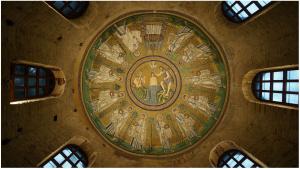 In my previous article, the concept of faith alone as forensic justification (FAFJ) was shown to be unknown to early Christians. They may have placed the words “faith” and “alone” together in a sentence, but they did not have in mind Martin Luther’s innovation of FAFJ. We now turn to baptism in the early church. Early Christians viewed baptism as a regenerative act that removes sin and restores the baptized to new life in God. They did not view baptism a mere symbol devoid of spiritual power.
In my previous article, the concept of faith alone as forensic justification (FAFJ) was shown to be unknown to early Christians. They may have placed the words “faith” and “alone” together in a sentence, but they did not have in mind Martin Luther’s innovation of FAFJ. We now turn to baptism in the early church. Early Christians viewed baptism as a regenerative act that removes sin and restores the baptized to new life in God. They did not view baptism a mere symbol devoid of spiritual power.
Luther and Baptism
Regarding baptism, Martin Luther (and many of the reformers) are in line with Sacred Scripture and the historical record. To Luther, baptism is not a mere symbol.
“What benefits does Baptism give? It works forgiveness of sins, rescues from death and the devil, and gives eternal salvation to all who believe this, as the words and promises of God declare.” (Luther’s Small Catechism)
Luther’s views of grave sin after baptism breaks with the historical Church. Furthermore, Luther’s innovation of FAFJ removes the real transformative nature of baptism and replaces it with a declarative statement whereby God inputs righteousness to the newly baptized. This view is contrary to Sacred Scripture and the early church historical record. Again, the way in which the early church addressed the crisis of grave sin after baptism shows unequivocally that FAFJ was totally unknown to early Christianity. Protestants and Catholics can argue over biblical interpretation, but the historical records are clear and cannot be easily interpreted away. This topic will be addressed more fully in the next article. In this article, I must establish the foundation of the sacrament of baptism.
Baptism in Sacred Scripture
Scripture teaches the necessary means by which God washes away sin in baptism by the Trinitarian normative form of Father, Son, and Holy Spirit . Through baptism, God applies Christ’s sacrifice to the sinner. The baptized, buried with Christ upon entering the waters, raises to new life in Christ upon their emergence. God’s grace restores spiritual life through baptism.
In John 3:5, Jesus instructs his followers that they must be born of water and the Spirit (baptism):
Jesus answered, “Truly, truly, I say to you, unless one is born of water and the Spirit, he cannot enter the kingdom of God.”
In Matthew 28:19-20, Jesus gives The Great Commission and commands his disciples to make disciples of all nations. The beginning of this discipleship is Trinitarian baptism:
19 Go therefore and make disciples of all nations, baptizing them in the name of the Father and of the Son and of the Holy Spirit, 20 teaching them to observe all that I have commanded you. And behold, I am with you always, to the end of the age.”
Peter in 1 Peter 3:21-22 draws a parallel to Noah and the flood (verse 20) and baptism:
21 Baptism, which corresponds to this, now saves you, not as a removal of dirt from the body but as an appeal to God for a good conscience, through the resurrection of Jesus Christ, 22 who has gone into heaven and is at the right hand of God, with angels, authorities, and powers having been subjected to him. [emphasis mine]
Baptism in the Post Apostolic Church
We now turn to Christians whose writings, while insightful, are not on the same level as Sacred Scripture. For continuity sake, the accepted dates on these writings appear the end of each quote. I show that the universal (Catholic) teaching on baptism as the means by which God removes sins.
The Didache
The Didache is the earliest Christian catechism. It provides instruction on the proper form of Trinitarian baptism. While the Didache offers no insight into the spiritual dimension of baptism, it is helpful to trace the continuity of the Trinitarian form.
“And concerning baptism, baptize this way: Having first said all these things, baptize into the name of the Father, and of the Son, and of the Holy Spirit, in living water. But if you have not living water, baptize into other water; and if you cannot in cold, in warm. If you have not either, pour out water thrice upon the head into the name of Father and Son and Holy Spirit. But before the baptism let the baptizer fast, and the baptized, and whatever others can; but you shall order the baptized to fast one or two days before.” (Didache, Chapter 7. Concerning Baptism [AD 50-70]) [emphasis added]
Shepherd of Hermas
The Shepherd of Hermas offers the earliest clear teaching on baptism as remission of sin outside of Sacred Scripture. The Shepherd teaches only one baptism for the remission of former sin. This will come into play later as the church struggles with what do with the baptized who commit grave sin. Is there forgiveness available for those who commit grave sin after baptism? The answer to this question is crucial to how early Christians viewed salvation.
“‘I have heard, sir,’ said I [to the Shepherd], ‘from some teacher, that there is no other repentance except that which took place when we went down into the water and obtained the remission of our former sins.’ He said to me, ‘You have heard rightly, for so it is.’” (The Shepherd 4:3:1–2 [AD 80]). [emphasis mine]
Baptism in Justin Martyr
Justin Martyr, the first Christian apologist, used the word “regenerated” to describe the spiritual transformation in baptism. To Justin, regeneration in baptism meant born again in the Spirit. All unbaptized could not enter the kingdom of heaven. Here to, Justin Marty reaffirms the continuity of the Trinitarian formula for baptism.
“As many as are persuaded and believe that what we [Christians] teach and say is true and undertake to be able to live accordingly . . . are brought by us where there is water, and are regenerated in the same manner in which we were ourselves regenerated. For, in the name of God, the Father and Lord of the universe, and of our Savior Jesus Christ, and of the Holy Spirit, they then receive the washing with water. For Christ also said, ‘Except you be born again, you shall not enter into the kingdom of heaven’ [John 3:3]” (First Apology 61 [AD 151). [emphasis mine]
Hippolytus
Hippolytus encouraged the unbaptized to “fly” to the waters of baptism and be born again by water. To not come meant remaining in the “spirit of insanity.” It is insane to avoid what leads to one’s own salvation. Hippolytus, too, continues the Trinitarian form.
“Perhaps someone will ask, ‘What does it conduce unto piety to be baptized?’ In the first place, that you may do what has seemed good to God; in the next place, being born again by water unto God so that you change your first birth, which was from concupiscence, and are able to attain salvation, which would otherwise be impossible. For thus the [prophet] has sworn to us: ‘Amen, I say to you, unless you are born again with living water, into the name of the Father, Son, and Holy Spirit, you shall not enter into the kingdom of heaven.’ Therefore, fly to the water, for this alone can extinguish the fire. He who will not come to the water still carries around with him the spirit of insanity for the sake of which he will not come to the living water for his own salvation” (Homilies 11:26 [AD 217]). [emphasis mine]
Novatian
Novatian (another anti-pope) instructs that baptism is a return to our previous innocent state before the fall. It is the “dissolution of death.” Furthermore, to return to sin after baptism is to return to the slavery of sin.
“Because in baptism and in the dissolution of death the flesh is raised up and returns to salvation, by being recalled to the condition of innocence when the mortality of guilt is put away.” (A Treatise of Novatian Concerning the Trinity Chapter X [AD 258])“Yet there is no advantage at all of righteousness, while we are recalled by a voluntary slavery to those elements to which by baptism we have died.” (Novation: On the Jewish Meats Chapter VI). [emphasis mine]
Portance of Things to Come
Hippolytus and Novatian here foreshadow the future conflict in the early Church over the forgiveness of grave sin after baptism. Both Hippolytus and Novatian took the more rigorous stand on this issue. The conflict to come, the arguments and resolution, shows a total lack of Luther’s understanding of the concept of FAFJ. For now, I’ve shown the that early Christians viewed baptism as salvific in nature.
Like what you read? Please check out my other writing here.
Please like and follow me on Facebook.












